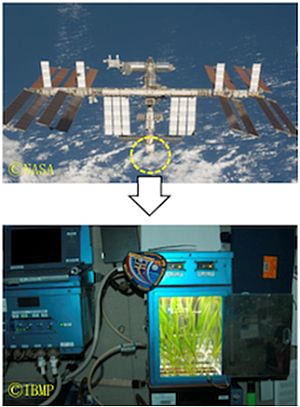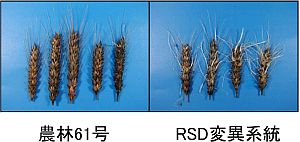Plant Cytomolecular Biochemistry

Plants are sensitive to various environmental stimuli. They respond to physical, chemical, and biological stress factors. Consequently, plants can undergo changes in their development, morphology, and physiology during their life cycle. We have used biochemical and molecular biological techniques to elucidate the functions of enzymes, proteins, and gene regulating factors, which are all related to stress tolerance mechanisms of plant cells under environmental stress conditions. Through our research, we aim at developing plants that can adapt well to adverse and extreme environments to resolve difficulties such as food shortages and environmental degradation.
|
Analysis of plant adaptation mechanisms under space environments and development of space stress-tolerant plants
 We have analyzed the response and adaptability of plants in extreme environments such as radiation, ultraviolet rays, microgravity, and temperature fluctuation at the molecular level using biochemical and molecular biological techniques. We aim to develop plants that can grow in extreme environments by clarifying the problems that can occur in crops stored and cultivated in extreme environments and the conditions that are essential for crop production.
We have analyzed the response and adaptability of plants in extreme environments such as radiation, ultraviolet rays, microgravity, and temperature fluctuation at the molecular level using biochemical and molecular biological techniques. We aim to develop plants that can grow in extreme environments by clarifying the problems that can occur in crops stored and cultivated in extreme environments and the conditions that are essential for crop production.
|
Analysis of regulatory mechanisms for seed dormancy in gramineous crops
 In wheat cultivation in Japan, the occurrence of sprout germination due to rain during harvest is a serious problem. The dormancy of seeds is one of the causes of the germination of the panicle. Norin 61, a cultivar of wheat, is one of the varieties with strong seed dormancy and resistance to ear germination. We have analyzed the control mechanism of seed dormancy in wheat using a dormancy-reducing mutant strain produced from Norin 61.
In wheat cultivation in Japan, the occurrence of sprout germination due to rain during harvest is a serious problem. The dormancy of seeds is one of the causes of the germination of the panicle. Norin 61, a cultivar of wheat, is one of the varieties with strong seed dormancy and resistance to ear germination. We have analyzed the control mechanism of seed dormancy in wheat using a dormancy-reducing mutant strain produced from Norin 61.
